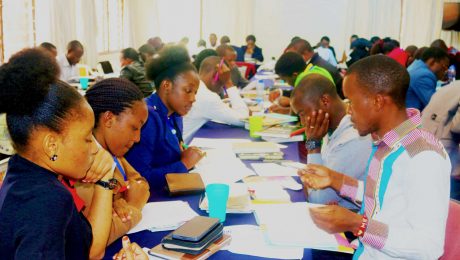
The First Year Student's Experience
Every student in universities and colleges has only one chance of being a first-year student. Most of the graduates can recall the first year of their campus or college life. The experiences of first years differ based on many factors such as their prior level of exposure, social economic status, and the level of support from the continuing students among other factors.
Nevertheless, all first-year students will exhibit a certain level of common characteristics. First, they are vulnerable. For some of them, it would be their first time to be separated from their parents while for others, it would be their first to experience unmatched freedom. Secondly, they experience a significant level of pressure because their loyalty is being sought after by many suitors. This pressure alone is enough to cause unnecessary anxiety and tension among them.
Harassed and Helpless
By all the standards, first years fit the category that Jesus described as “harassed and helpless, like sheep without a shepherd”. While many would like to exploit the harassment and the helplessness of the first years, the Christian community respond in a similar manner as that of Christ when he saw the crowds. He had compassion for them. He exclaimed, “The harvest is plentiful, but the workers are few. Ask the Lord of the harvest, therefore, to send out workers into his harvest field.” Matthew 9:36-38.
Why you should be interested
Every believer in the campus community should be interested in the well-being of the first-year student. There is no better concern than giving the first-year student an opportunity to know Christ. Naturally, the first-year students are open to the gospel, they are eager to learn and experience new things and at the same time, they are crucial for the growth of Christianity in the institution and later on become the future transformation agents for church and society.
It is for these reasons that FOCUS Kenya runs Every Fresher for Jesus Campaign, at the beginning of every new academic year. The campaign seeks to mobilize all Christian students to share the gospel with all first-year students in their first 30 days on campus. Our primary goal for evangelism is to give every student an opportunity to hear and respond to the gospel. More than hearing the gospel, we want them to believe, love and follow Jesus.
The campaign is anchored on God’s command to make disciples of all nations. It is inspired by Jesus’ compassion for the harassed and the helpless. We want them to know that Christ reigns at the University and the world over. We make use of the open window of their availability when they have a little or no academic load in their first few days on campus.
We all can do something
The campaign will require the participation of every believer. The Christian student on campus, the faculty, and Associates. First-years are many, and they need many more Christians to share the gospel with them. To reach all the first years with the gospel, we need at least all the students attending a CU Sunday service to share the gospel with 2 first years. We need all born-again students to share the gospel with at least two other students through a range of evangelism strategies that will be friendly to even those sharing the faith for the first time.
The Invitation
We invite the Christian professionals to join us in prayer for the next 3 months, trusting God for the salvation of first years. You can join the Christian Union close to you and ask the student leaders how you can support them. You can offer financial support to the CU to facilitate the necessary resources. Pray with us, ‘may Your will be done in Campus, as it is in Heaven’.

- Published in First Years
Beautiful Mess
I ask myself if I have a beautiful message to share with you this Easter but all I have is this beautiful mess. The ultimate epitome of who I am meant to be; my legacy, and to be honest, I don’t have the will to fight it anymore.I am as lazy as one can get
- Published in Students' Blog
My Precious Christ
With love you weptWith the cross you creptCrying all the way to CalvaryTo shame the devil the rivalryWith love, just for meJailedNailedJust for me, with loveEverything I drive myselfTo strive so hard to love you backThe same way you loved me If one day oh Savior, my pride grows than my love for you, remind
- Published in Poems, Students' Blog
Invisible Day of Redemption
Why bygones be bygones as the adage goes?I sat by the river side as page by page the past from my memory flowsI picked a pebble and tossed into the air and left it fall back into the watersSlowly I rose up and billow back home.Pride still eating my inside, I tried my best but
- Published in Poems, Students' Blog
Calvary
POEM ON CALVARY Lord, I can hear you calling,I can see the affection, the compassion in your eyes,I can still hear your forsaken cries, the voice of you calling,Lord, I know I can fathom less of your form,But I know you want the best for me,Lord, I can still hear their voices “crucify him”At the
- Published in Poems, Students' Blog
Trusting an Unchanging God in Unfamiliar Times
It is a rather difficult time for any graduate to be engaging transition from campus to the job market. Some have been gripped by fear and wallow in hopelessness wondering how life will be and how soon we will get back to normalcy. Just when we thought we were almost done with the devastating effects
The Silent Nights | Poem
The silent nights are terrible. Not because I fear the dark or the movement of the cat and the mother as they hunt for food but because my mind is not silent. I have headaches… I have to reflect about who I am, who I was and what I’m going to become… Time is passing
- Published in Integral Missions, Poems
Mental Problems we will fight you!
We live in a world, where we choose to be the bearers of our pain and suffering We choose to die deep in silence, in the nights our own hearts drenched with tears Tears we don’t even bother to wipe coz the flow is just ceaseless For all our hearts know is pain Our hearts
- Published in Integral Missions, Mental Health, Poems
What I wasn’t told when joining Campus
Joining a college or university is an exciting journey, it is always a dream come true. I still remember with nostalgia the day I received my admission letter to the university. Unlike these days of portals and online registration, we received a booklet of admission documents via the postal office. There is something unique about
- Published in Anza Fit, First Years
Job Seeking in Times of Adversity
The Desire of Every Graduate After at least three years of hard work in a college or university, it is every graduate’s dream to find a job. First to support self, then family. For most graduates, their families have invested heftily in their education. These families hope that, after graduation, they will get shouldering in
- 1
- 2






